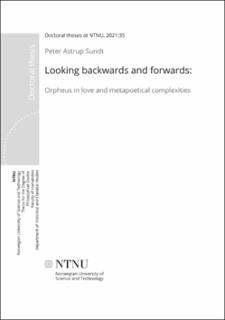Looking backwards and forwards: Orpheus in love and metapoetical complexities
Doctoral thesis
Permanent lenke
https://hdl.handle.net/11250/2726793Utgivelsesdato
2021Metadata
Vis full innførselSamlinger
Sammendrag
The thesis Looking backwards and forwards – Orpheus in love and metapoetical complexities analyses the mythical poet Orpheus of Thrace, and argues that in his capacity as a tragic and unsuccessful lover, he provides a metapoetic figure for a range of poets (both male and female) from antiquity to the present day. Through close reading, the thesis analyses depictions of Orpheus across a broad range of time periods and poetic genres. Each main chapter deals with three thematically linked texts which in the case of chapter 4 includes instances of classical reception. Chapter 1 investigates the appearance of Orpheus within poetic catalogues in the Hellenistic Greek poems Leontion by Hermesianax, Argonautica by Apollonius Rhodius and Loves or Beautiful Boys by Phanocles. Chapter 2 analyses the use of Orpheus within Greek and Roman poetic laments, represented by the Greek anonymous poem Lament for Bion, Statius’ Siluae 2.7 and Horace’s Carmina 1.24. Chapter 3 looks closer at the Roman poet Virgil’s famous depictions of Orpheus across his poetic collections, Eclogues, Georgics and Aeneid. Chapter 4 explores the use of Orpheus to convey marriage criticism within the Roman poet Ovid’s Metamorphoses, the British dramatist Henry Fielding’s Eurydice: Or the Devil Henpeck’d (1737), and German/French operetta composer Jacques Offenbach’s Orphée aux enfers (1858). Through studying these sample texts, the thesis argues that the figure of Orpheus acts as a vehicle for thinking more broadly about the poet’s role within the poetic tradition and the wider social and political context.
